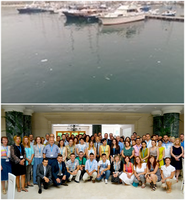Fostering regional cooperation for a marine litter-free Mediterranean Sea – Jul 28, 2016
- Marine litter poses a major threat to wildlife and ecosystems, as well as, to humans and their livelihoods.
- Regional cooperation is crucial to achieve the marine litter reduction targets decided by the Barcelona Convention COP 19, including a beach litter reduction of 20% by 2024”.
Representatives of 17 Mediterranean countries and other participants from the region and from Belgium and Ireland, met in Tirana, Albania on 19 and 20 July 2016, to enhance the implementation of the Regional Plan for the Management of Marine Litter in the Mediterranean.
Jointly organized by the UNEP/MAP’s MEDPOL Programme and the IPA-Adriatic funded DeFishGear project, the meeting was opened by Gaetano Leone, Coordinator of UNEP/MAP – Barcelona Convention who said 'the Marine Litter Regional Plan opens new perspectives for concrete contribution and partnerships with major actors in the field of marine litter management such as with fisheries, shipping, industries, local authorities, civil society including scientific and academic sector, private and public sectors, etc. We look forward to creating a network of collaboration and harmonizing our common efforts to maximize results’.
Mediterranean countries took an important step forward in 2013 addressing marine litter management by adopting the first ever legally binding regional plan containing measures and timeframes for their implementation on marine litter management, including prevention, reduction, monitoring and assessment. The regional dimension is indispensable to foster and strengthen coordinated national action to meet commitments on marine litter in the context of the Sustainable Development Goals. Therefore, the meeting presented the latest trends and findings on marine litter in the Adriatic, Ionian and Mediterranean Seas with regards to amounts, sources, impacts, implications and solutions. Aiming to enhance the implementation of the Regional Plan for Marine Litter Management in the Mediterranean, the meeting offered a platform for participants to present and exchange their experiences and lessons learned from addressing land-based and sea-based sources of marine litter.
The meeting was also the closing event of the 3-year DeFishGear project, which was an opportunity to share the collective experience gained from actions implemented on the science-policy-society interface for a litter free Adriatic and Ionian coast and sea. This has ranged from addressing the marine litter knowledge gaps to piloting concrete measures, ultimately facilitating effective decision making.
At the end of the two-day meeting, participants agreed on the need to set Mediterranean common goals and measures to enhance the implementation of the regional plan on marine litter. They also acknowledged the importance of awareness raising and capacity building in the countries.


